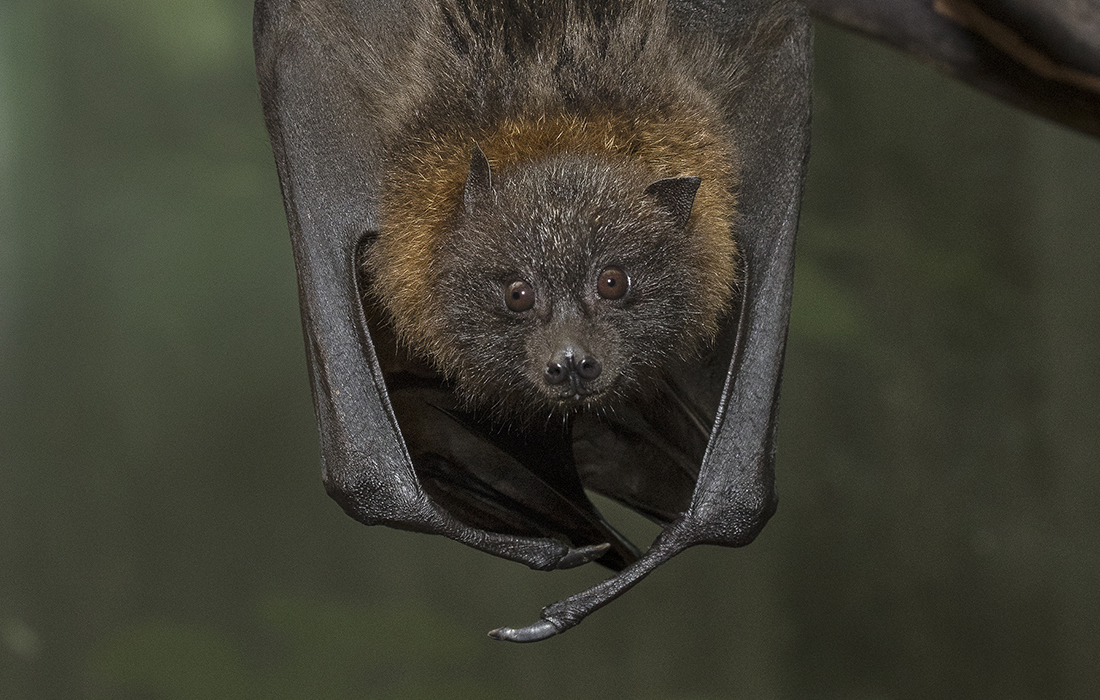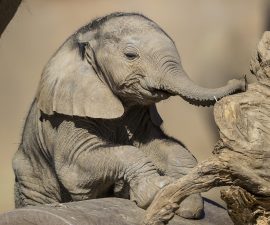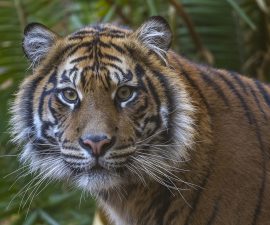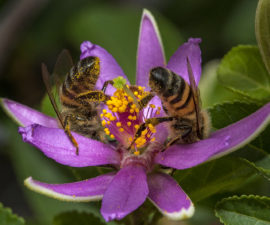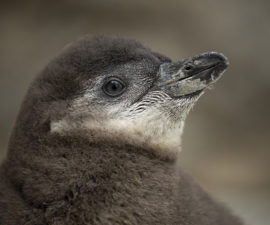BY Peggy Scott
Photography by Ken Bohn
No superhero goes it alone. Whether they have partners, sidekicks, or mentors, do-gooders of the world (including those in the Animal Kingdom) need the occasional helping hand. And just as orphan Bruce Wayne’s Batman had Alfred to get him started on the road to greatness, Lucas the Rodrigues fruit bat has the Safari Park Ione and Paul Harter Animal Care Center’s dynamic keeper staff to help his saga take flight.
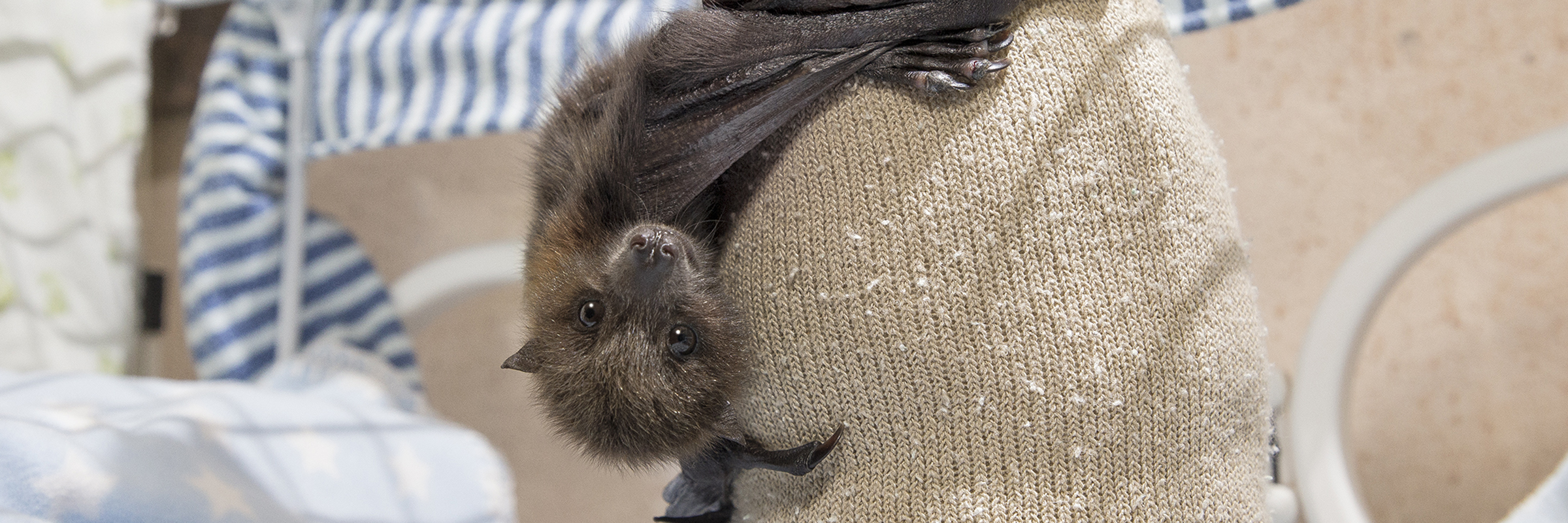
A Rough Start
The fictional Batman story focuses on an orphaned boy, and Lucas’ tale has a somewhat similar beginning. In the morning hours of January 11, 2017, keepers at the Safari Park’s Bat House noticed that Patty the Rodrigues fruit bat Pteropus rodricensis, an expectant first-time mother, was experiencing distress with her labor, and a trip to the Paul Harter Veterinary Medical Center revealed that the pup was too big for Patty to deliver. Veterinarians performed what is believed to be the first-ever C-section on a Rodrigues fruit bat, but unfortunately, Patty did not survive, and her tiny baby was in a precarious state. “The fruit bats are so delicate when they’re so young,” explains Jules Anderson, one of Lucas’ keepers. “But he was a little fighter from the start.”
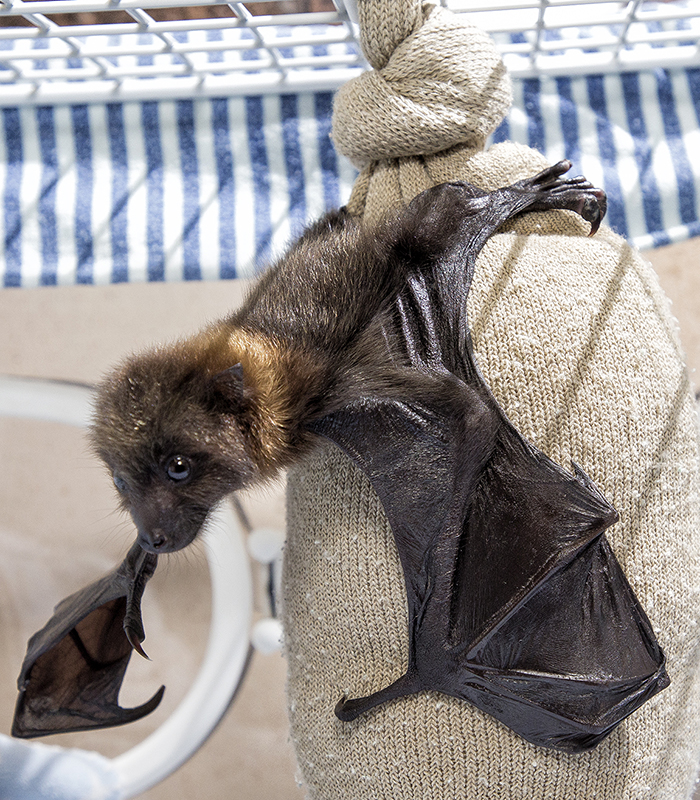
HANG IN THERE, BABY (BAT)!
A stuffed sock was used as a maternal substitute for Lucas, giving him a soft, warm place to “hang out.”
For the first weeks of his life, Lucas received round-the-clock care, with Jules spending many nights with her tiny charge, feeding him every two hours inside a controlled incubator that was set between 85 and 89 degrees Fahrenheit, with 75 percent humidity. The conditions, designed to regulate his body temperature and provide enough humidity to keep his wings pliable, replicated an atmosphere not unlike the critically endangered species’ native habitat of Rodrigues Island in the Indian Ocean. But even with all those precautions in place, keepers realized the challenges they—and little Lucas—faced. “It was nerve-wracking,” Jules admits. “Our biggest fear was that he would aspirate. You have to be so careful feeding with that tiny syringe. Every move is carefully planned out.” The bat pup received human infant formula because, as with primates, this specialized species cannot synthesize vitamin C as most other mammals do. The duration of these feedings, however, was up to Lucas. “He tended to fall asleep during his feedings,” recalls Kimberly Millspaugh, senior animal keeper, and another member of Lucas’ team. “Sometimes he wanted to play or just wanted attention.”
The keepers also devised a surrogate maternal figure for Lucas. He spent his early weeks attached to a “sock mom.” “We blanketed him around the sock figure to mimic his mother and her wings,” Jules says. The tiny pup—even at five months of age, Lucas only weighed about six ounces—also had plush toy bats and monkeys to keep him company.
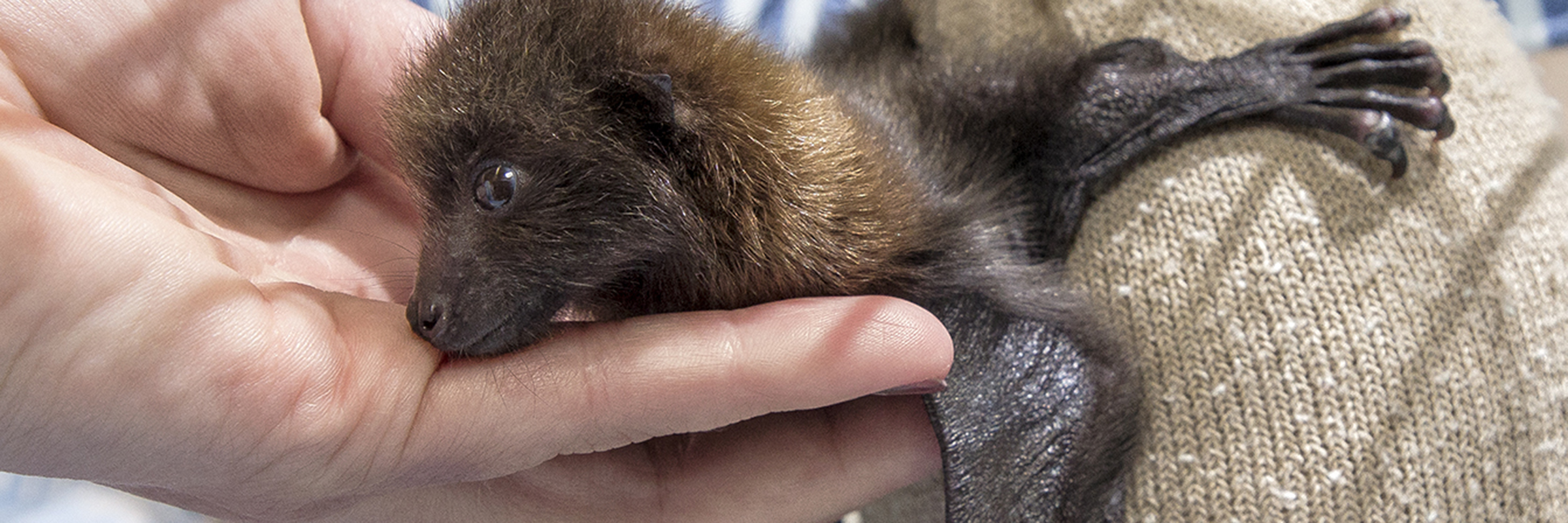
Growing Confidence
As Lucas grew, so did his personality. As he cuddled with his keepers, he listened to them as they talked to him, his ears flicking to and fro. And he often responded with squeaks, squawks, and clicks. “He still lets us know when he doesn’t like something,” Jules says. He developed a taste for papaya, which proved to be attractive enough to distract Lucas during blood draws and other husbandry procedures. “We have learned so much from him,” Jules says. She notes that the brave little bat tackled pretty much anything that came his way, adding that he also let her know when he reached a milestone. “One day, I came in and he wasn’t on ‘sock mom.’ He was hanging from the enclosure. That was the day we disassembled his ‘crib.’ He was growing up.”
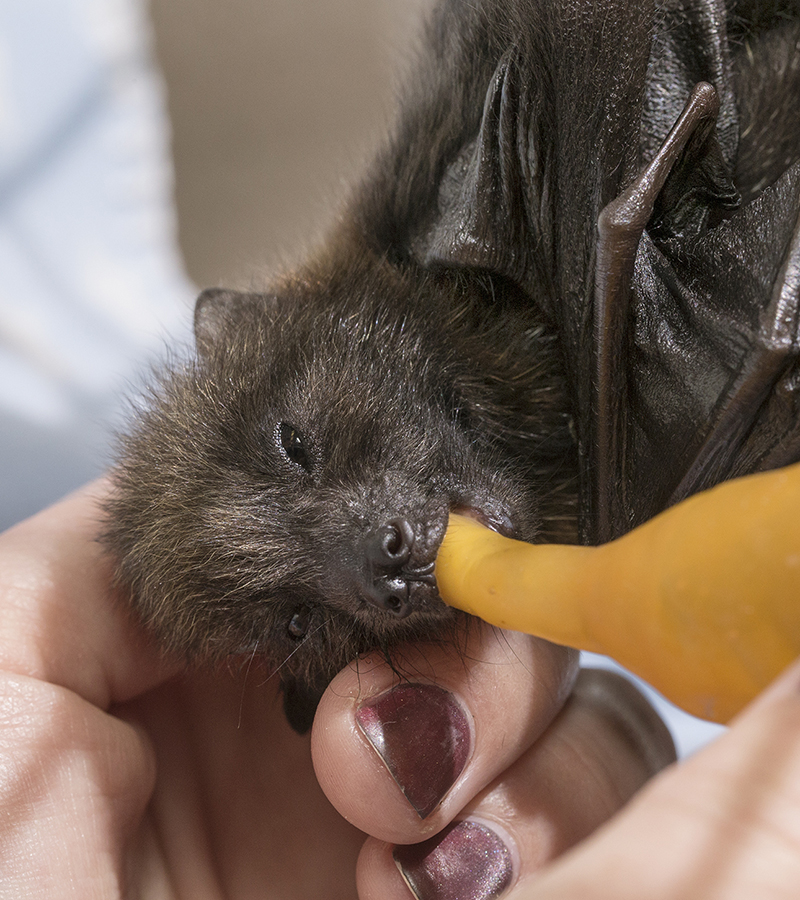
DRINK UP!
Lucas was fed human infant formula because, like humans, bats cannot synthesize vitamin C as most other mammals do.
Jules explains how Lucas’ unusual beginning and continued progress has helped bat conservation in general. “With all the attention his birth attracted, we were able to tell people about a species they knew nothing about, or were scared of,” she says. “We are eager to spread knowledge and remind people of the importance of every part—every member—of an ecosystem. Fruit-eating bats, for example, spread seeds through their guano.” Insect-consuming bat species help prevent diseases like West Nile virus and help save crops from pests. Bat droppings support bacteria useful to humans, including the production of antibiotics.
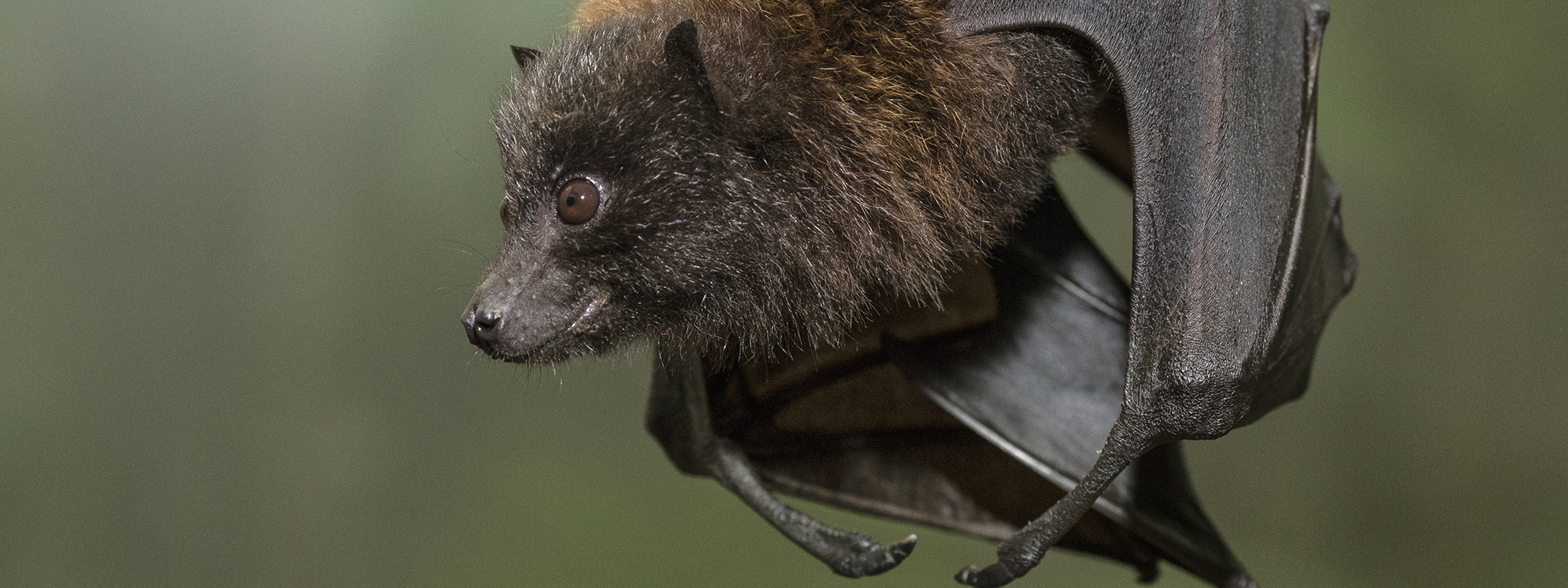
Spreading His Wings
By the end of March 2017, it was apparent that Lucas’ keepers were going to do double duty as his flight crew. As Jules detailed in a blog post, Lucas began moving around more in his housing, and keepers added mesh fencing, ladders, and cubes so he could move with ease, climbing from area to area. Once he began swinging back and forth and then fluttered toward Jules, she knew it was time to teach him to fly.
Keepers worked with Lucas to control his flight pattern. Jules notes that a slight physical abnormality might complicate his training. “He has one digit [in his wing] that is shorter than the others, but we weren’t sure how much it would affect his flight,” she says.
To help get his flying career off the ground, Jules wrote, keepers would let Lucas hang from their fingers, gently swing him back and forth, and then, on the count of three, let him go, allowing him to flap his wings to feel the air beneath them. One keeper stood at a higher point while another waited at ground level, and Lucas was able to flutter down while flapping his wings. We had takeoff! The only thing left was for the new little “pilot” to get in enough hours and hone his skills.
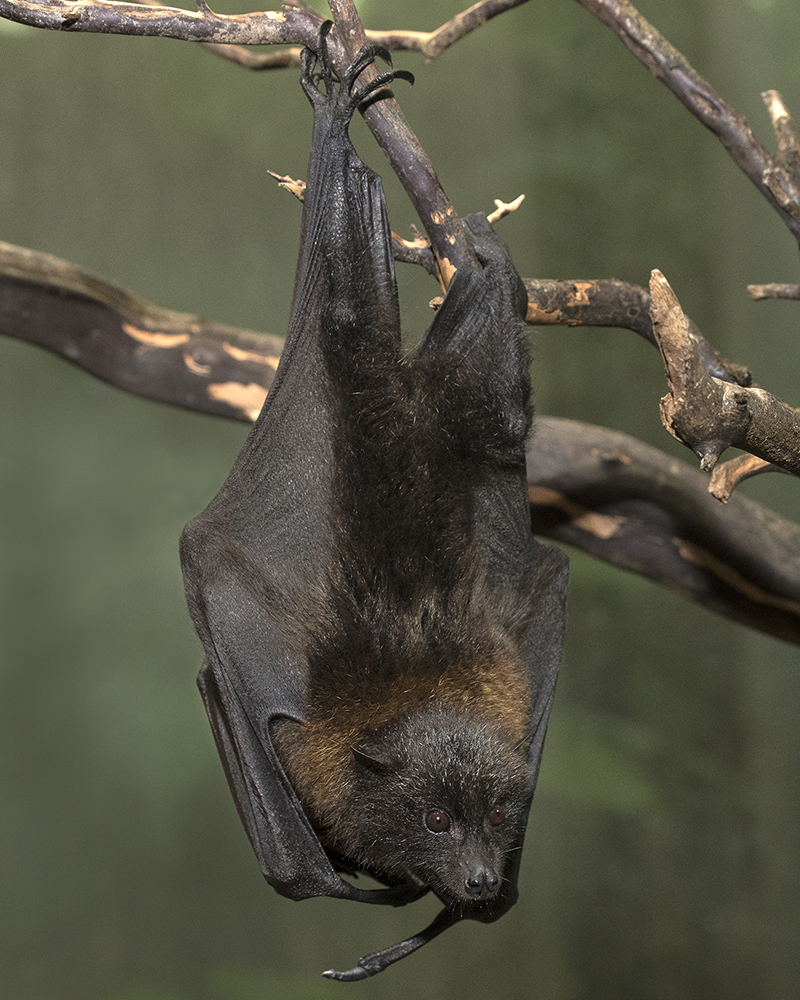
MISSION COMPLETED
Lucas is getting ready to be introduced to the Park’s colony of Rodrigues fruit bats.
Lucas is also getting a little preview of the next part of his story. His “room,” in the Park’s Bat House, is separated by a glass wall from the colony of 17 Rodrigues fruit bats, and some of them have shown interest in their neighbor. There are two juveniles in the group around Lucas’ age, and keepers hope relationships form. “There’s definitely a social structure, and we’ll work to find Lucas his place in it,” Jules says.
A veteran keeper, Jules notes that Lucas is an animal that made a special impression on her. “I never had a favorite animal until now,” she says, adding that his success story makes her proud. “Our little ‘bat boy’ is ready to be a ‘bat man.’”

